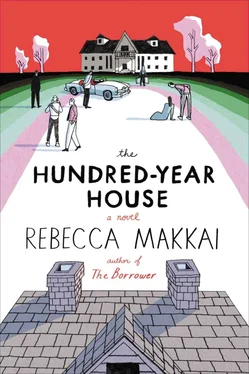Across the lawn, windows full of elegant locals. Long tables, candles.
The eight undressed in the open teepee by torchlight, laughing and shushing, leaving clothes in distinct piles to speed escape. Zilla, muscled, flat as a board. Viktor — with his impossible limbs, his dancer’s limbs — staring at her like a drugged man. Ludo, pale for an Italian, a thatch of dark fur on his chest. Fannie and Josephine, the White Rabbits: one doughy, one thin as rope. Armand Cox (preposterous name!), his whole being covered in golden hairs. Marlon with his little potbelly, stretching his legs to run. Two weeks ago, Eddie hadn’t been able to keep them all straight. And now he imagined he’d know their voices to his dying day.
Another adjustment: All day long, in front of his pen or typewriter, he was as alone as he’d ever been. But at night, he was a “we.” Something he hadn’t felt since childhood, since he’d climbed in bed with his sister in the afternoons, since she’d let him wear her shoes. He was part of a first-person plural.
Some of them wore the headdresses, and the others stuck loose feathers in their hair. Their faces: red and black stripes, yellow down the nose.
Armand and Ludo, leading the parade, each grabbed one lawn torch to hold aloft.
Zilla started the war cry, hand pulsing on her open mouth, and the others joined and rode the wave of noise onto the club porch and through the open glass doors to the dining room.
The first thing Eddie saw, he told the others later, was the fat woman in the green dress, the way her fork flew from her hand, lettuce still speared on the tines.
The tribe whooped and screeched and circled the sea of tables three times. A great deal of anatomical flapping: some high, some low, all uncomfortable, all ridiculous in the electric lights, but wasn’t this the point? As the rest of them flailed and beat their chests, Viktor did actual pirouettes. He leapt over the carving table, his legs straight out like wings. The evening-gowned ladies dove into their husbands’ laps. Half the men laughed and clapped and the others stood to do something but then weren’t sure what to do.
Someone screamed, “ Stop them!”
Ludo shouted, “We come for squaws!”
Two white-haired men tried to block the path, but moved away quickly when Armand and Ludo didn’t stop, as Armand even turned and shimmied backward toward them, posterior muscles twitching. The youths, boys and girls both, watched with poorly contained glee. Viktor planted a kiss on a squealing girl’s forehead and left a perfect black lip mark. On the final circuit, Eddie grabbed a dinner roll and stuffed it in his mouth.
Back into the night: some of the tuxedoed men giving chase, but only halfway across the lawn, then posting themselves cross-armed between teepees and building, shouting, guarding against further invasion.
A loud voice thinned by distance: “This is a private establishment !”
Zilla wheezing with laughter. Armand, torch abandoned, turning a cartwheel.
The artists carried clothes in armloads and ran, some back to the waiting auto, some, with Eddie, into the woods where they dressed, and then found the path to the road, and then walked the road back to Laurelfield.
She has assembled seven things on the table in the Longhouse: a potted geranium, a pile of gray rocks, a hair pin, a square of yellow cotton, a Mason jar, a feather, a dead bee. She has stapled a linen to the wall.
The choosing, the starting: It’s a cliff to jump off.
She examines the feather, the way invisible hooks link each barb to the next. The way, when she pulls one strand from its neighbor, it leaves a clean gap that will not smooth together again. She doubts this cleaving can be conveyed in paint: the hooks that grip us, that tie us to each other. To place, to time. The ways we might come unhinged.
She walks to the wall and begins.
AUG. 29–29.
SAMANTHA MAYS
CARE LAURELFIELD ARTS COLONY
HEARD OF DISTURBANCE STOP IN NY CITY ON BUSINESS STOP ARRIVE LAURELFIELD TOMORROW AFTERNOON STOP DO MAKE PREPARATIONS=
G W DEVOHR
It was raining all morning, dusk all morning.
From the windows of the director’s house, the main house looked reflective, all windows and wet.
Samantha laid the telegram on the middle of her kitchen table so they all could read it: Armand over her shoulder, Viktor and Zilla leaning across. “He sounds furious.”
Zilla said, “Everyone sounds furious in a wire.”
They kept their voices low. Beatrice, Samantha’s brand new office girl, was typing in the next room and needn’t be alarmed. Samantha warned her the day she started that Laurelfield was hanging by a thread, that Gamby Devohr, newly in charge of his family’s affairs, would take any excuse to oust them all.
Armand said, “We don’t even know what disturbance he means. Heard of disturbance . He could think there are real Indians in the woods.”
Viktor was playing with a spoon, spinning it on the oilcloth. “He’s not the world’s leading intellectual.”
Samantha read it again, aloud. They turned on the floor lamp, the one with no shade, and dragged it to the table. As if more light would possibly help.
Zilla said, “What can he prove? No one took our photograph. I’m sure they weren’t looking at our faces .” Zilla’s voice was calming even when there was no cause for calm. Samantha had once thought of it as a liquid voice, but lately she’d refined the image: Zilla’s voice was mercury, a bubble of mercury in a phial. Liquid but metallic too.
“He can’t expect me,” Samantha said, “to keep everyone quiet in their rooms all night. We’re not bankers . I think he’d like to run a banking colony.”
Zilla said, “At least I’ll meet the infamous Gamaliel Devohr.”
“Gamby the Great,” Viktor said.
Armand: “We’ll meet Mr. Devohr as he’s kicking us to the curb. We’ll meet the bottom of his foot.”
Viktor: “He can do that?”
Samantha: “It’s his house, still. As far as the colony, he’s just a member of the board. But he owns the property. If he kicks us out, we cease to exist.”
“How nice for the Devohr family taxes,” Armand said. “To turn your spare mansion into an artists’ shelter.”
“It’s the only charitable thing they’ve ever done. Lord knows they aren’t patrons of the ballet. And now they’d rather get the house back and sell it. I don’t believe they’ve done well since the war.”
“Oh, it’s nothing,” Zilla said. “I’m sure it’s nothing.”
Viktor stood and stretched — the man was a tree, his hands on the ceiling, pressing it away — and announced he was heading back to the Longhouse to work, and Zilla announced she would follow him. Armand and Samantha watched them go.
“Oh, Armand,” she said. He sat at the table, and she put her head on his shoulder.
“They’re in love, aren’t they? Viktor and Zilla?”
“I should think so. She’s married, though, and he’s got all those dancers, and she hates that he’s got his dancers. They always come here the same time, just to torture each other. I believe it’s an excruciatingly chaste affair. They’d never moon around like that if they’d had each other.” She folded the telegram up, as small as it would fold.
“We ought to lock them in her studio together and see what happens.”
“It’s fascinating to watch, except when it’s painful.”
“Mr. Devohr will love your new hair.”
“Ha!” She touched what was left of the blonde curls. “He might run screaming. And end our problem.”
Читать дальше












